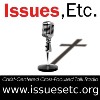
We live in a world where the only thing that seems to be constant is change. Media, especially electronic social media, contribute to our sense of frequent flux: Snapchat “snaps” are available for only a limited time; facebook posts can be deleted any time; and web blogs always can be taken down. Even traditional print media—newspapers, magazines, and books—that sometimes exist electronically can be subject to constant change, changes not only to the articles’ headlines but also changes to their content. What source can you be sure of, from moment to moment, day to day, year to year?
“The Word of the Lord remains forever”, so basically say both Isaiah 40:8 and 1 Peter 1:25, which latter passage essentially quotes the former passage. When God through the prophet Isaiah says, “The grass withers, the flower fades, but the Word of our God will stand forever”, he is contrasting the temporal transitoriness of created things with the eternal permanence of His Word. In its context in Isaiah chapter 40, “the Word of our God” arguably is both the Gospel prophecy of the coming Savior and that Savior Himself, Who, God goes on to say through Isaiah, “will tend His flock like a Shepherd … gather the lambs in His arms … carry them in His bosom, and gently lead those what are with young” (Isaiah 40:11). When the Holy Spirit inspired Peter essentially to quote the passage from Isaiah, “The Word of the Lord remains forever”, He emphasizes the Word of God as living and abiding (1 Peter 1:23) and says that the Word “is the good news that was preached to you” (1 Peter 1:25). Truly both the “good news” or “Gospel” about Jesus and Jesus Himself as the Savior are in view (confer Mark 10:29 and Revelation 14:6).
The Word of God that is Holy Scripture in some ways is indistinguishable from the Word of God Who is the Son of God, the Second Person of the Blessed Trinity, in human flesh as Jesus the Christ (for example, John 1:1-18). Holy Scripture reveals Jesus us to us (for example, Acts 58:26‑40), and Jesus Himself points us to Holy Scripture to learn about Him (for example, John 5:30-47). The Holy Spirit first works through Holy Scripture in all of its forms—including Holy Baptism, Holy Absolution, and the Holy Supper—in order both to bring us to believe in Jesus and to preserve us in that faith, but then, because we trust Jesus, we also have confidence in Holy Scripture as His Word. So, ultimately, what the song that many people learned as children says is true: “Jesus loves me! This I know, / For the Bible tells me so” (Lutheran Service Book, 588:1). The saving love of God in His Word, His Son Jesus Christ, is the material found in the form of His Word that is Holy Scripture.
That “The Word of the Lord”—Jesus and His Scripture—“abides forever” means that you can be sure both that what God expects of you does not change and also that what God does for you does not change. God’s law does not change over time, such as His Ten Commandments (for example, Exodus 20:1-17), and neither does God’s Gospel change over time, namely, His sending His giving His Son to death on the cross for you to believe in and so be saved from the temporal death and eternal torment that you otherwise deserve (for example, John 3:14-18). The absolute holiness that God demands is never relaxed, nor is the offer of the free gift of Christ’s righteousness ever revoked.
The statement that “The Word of God (or of “the Lord”) abides (or “endures”, or “remains”) forever (or “in” or “to eternity”)”, in Latin is Verbum Domini manet in aeternum, often in the shorthand initialism “VDMA”, though occasionally “VDMIA”, and often set around what is called a Greek cross as what we might consider to be a logo. For example, in his own 1532 and 1534 notes on Isaiah, the Rev. Dr. Martin Luther reportedly wrote simply the letters “VDMA” in one place where, compared to the transcribers’ notes on his 1527-1530 lectures on Isaiah, he meant the full statement (see at Isaiah 44:9 in the American Edition of Luther’s Works, volume 17, page 109, n.9, which page is indicated as translated from the Weimar Edition of Luther’s works, volume 31/2, pages 346, 347). Later, Dr. Luther in 1534 reportedly used a variation of the whole statement in German (Gottes wort bleibt ewig) on the title page of his German translation of the whole Bible. Also worth observing is that later in the Isaiah lectures, in transitioning from Isaiah 44:26 to 44:27, Dr. Luther summarized, “The Word of the Lord endures forever, and its righteousness of faith remains, but other righteousnesses and teachings disappear” (AE 17:119, indicated as translating WA 31/2:355). And, just before that comment, in referring to Isaiah 44:26, Dr. Luther said, “the Word of the church and of Christ’s servant … will remain and endure. [Its opponents’] word will perish … whether they like it or not”, which last clause in German, the translator or editor of AE 17 says, “echoes” a line of what may be Dr. Luther’s best-known hymn (AE 17:119, with note 12).
In that 1527 hymn translated as “A Mighty Fortress is Our God” (for example, Lutheran Service Book, 656), the third stanza ends discussing the devil’s defeat, saying “One little Word can fell him”. The “little word” likely is the Name of Jesus, which Name can stand for Jesus Himself and could include His Holy Scripture. Then, the fourth stanza begins with the lines, “The Word they still shall let remain / Nor any thanks have for it”. The enemies of the Gospel will let the Word remain (that “Word” is arguably the same “Word” as at the end of the third stanza), and, depending on how the German original is to be translated and interpreted, either the enemies of the Gospel “will not be grateful for it”, or the Word remains with the enemies’ “not even thinking about it”, or the Word remains “no matter what they think, whether they wish it or not” (see Joseph Herl’s discussion in Lutheran Service Book: Companion to the Hymns, #656-657, pp.837-840).
Even earlier, in 1522, Frederick the Wise reportedly had Verbum Domini Manet in Aeternum sewn onto his court’s official clothing and so worn by him and his servants. Frederick’s successors John the Steadfast and John Frederick the Magnanimous also reportedly used the statement, which is said to have become the official motto of the Smalcaldic League, which League formed in 1531 and which League subsequently similarly used the statement on uniforms, swords, flags, and banners, “as a symbol of the unity of the Lutheran laity who struggled to defend their beliefs, communities, families, and lives, against those who were intent on destroying them.” (See Concordia: The Lutheran Confessions, p.2, and one of several web pages that quotes from there, which page also both has pictures of historic uses and speaks to the statement’s enduring use).
Ultimately more important than the motto or logo’s enduring use, of course, is that the Word of the Lord itself endures forever. Attending college or university brings life changes. Yet, change is not the only constant: only the Word of the Lord is constant. You can be “wearied by the changes and chances of this passing world”, but, by and in the Word of the Lord that endures forever, you can rest in God’s “changeless peace” (Lutheran Service Book: Altar Book, Collect #171 p.446; confer #416, p.352).
If you want to read more about Pilgrim Lutheran Church as a congregation of the Word of God that endures forever, be sure to see this page, and if you are a student at one of East Texas’s colleges or universities, be sure to see this page.
The banner graphic at the top of this page adapts the Wikipedia Commons photo of the lentel of the Portal des Gewandhauses in Braunschweig, Germany, credited to Benutzer: Brunswyk and available to use under the terms of the GNU Free Documentation License. The uncredited image of the VDMA logo was obtained from here. Thanks go to Katy Myers for composing this page’s slider graphic on the front page, and thanks also go to Christine Siampos of the Reference Desk of the Kristine Kay Hasse Memorial Library at Concordia Seminary in St. Louis for research assistance with the electronic and print versions of the Weimar Edition of Luther’s Works.


